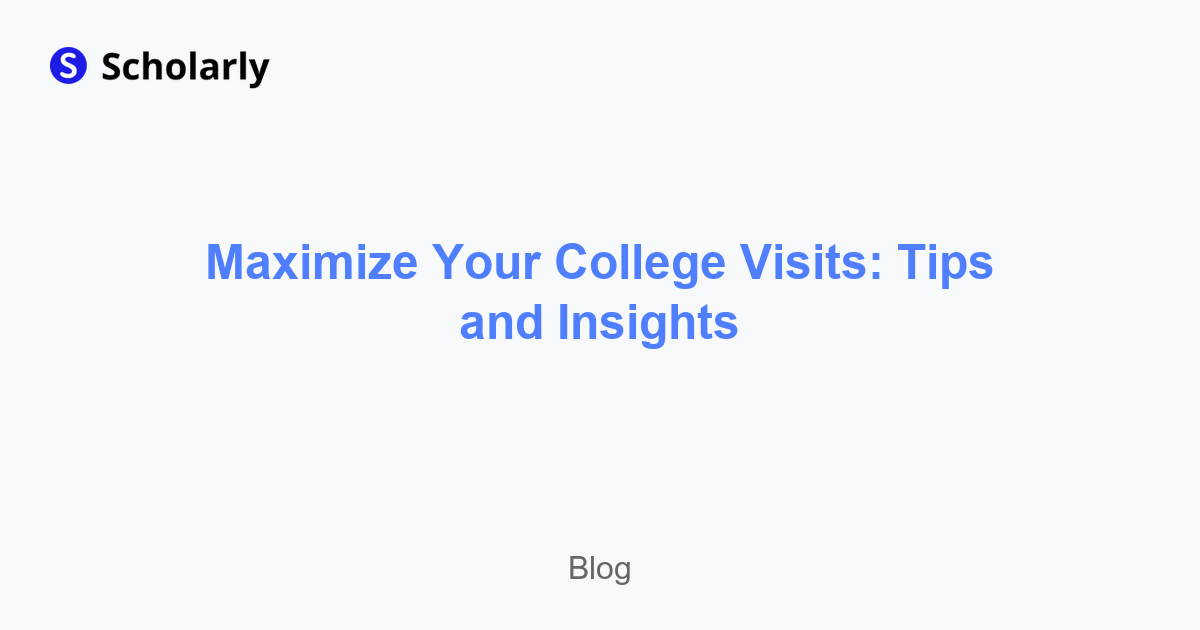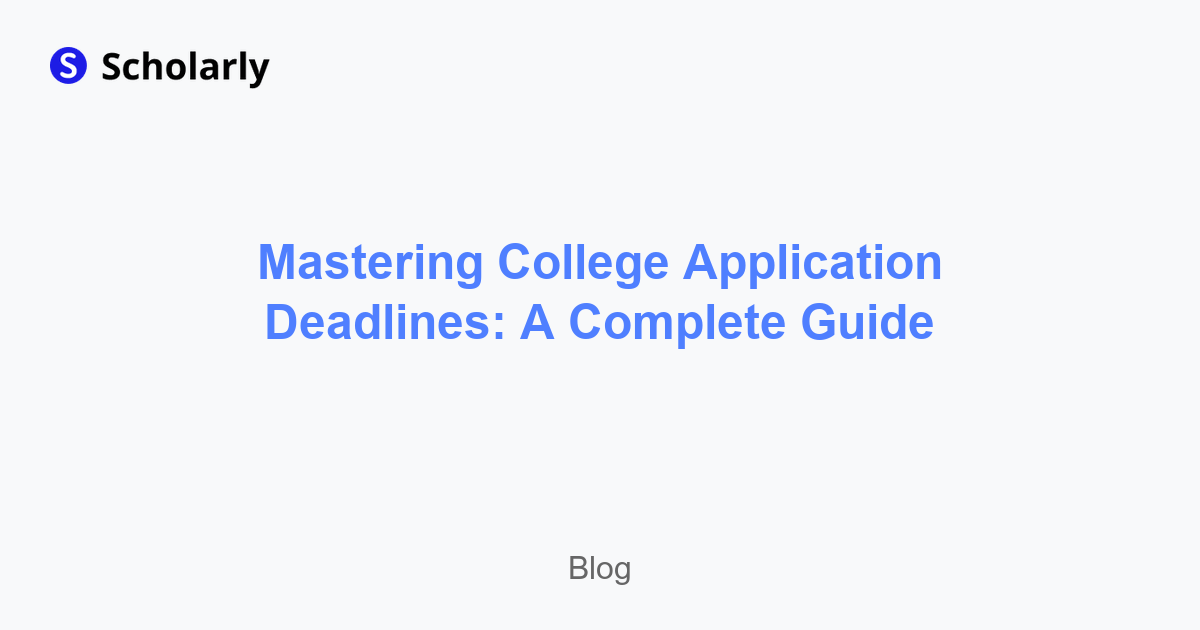Maximize Your College Visits: Tips and Insights
College visits can make or break your decision. Here's how to get the most out of every campus tour and figure out where you actually belong.

You can research colleges online for hours, read student reviews, and browse Instagram accounts. But nothing compares to actually being on campus.
A college visit can confirm that a school is perfect for you, or it can reveal dealbreakers you never would have discovered from a website. The cafeteria food might be terrible. The campus might feel too big or too small. The students might not seem like people you'd want to spend four years with.
Here's how to make the most of every college visit so you leave with real insights, not just brochures.
Why College Visits Matter
College visits help you answer questions that websites and rankings can't:
Does this campus feel like home? Some campuses just feel right. Others don't. You won't know until you're there.
Can I see myself here? Walking through dorms, sitting in the library, eating in the dining hall—these experiences help you visualize your daily life at that school.
What's the real campus culture? Websites show polished marketing photos. Campus visits show you actual students, real interactions, and genuine campus energy.
Are the facilities what I expected? Class sizes, lab equipment, dorm quality, recreational spaces—you can see and assess all of these in person.
Do I like the surrounding area? Urban, suburban, or rural? Walking distance to restaurants and shops, or isolated on a hill? Location matters more than you think.
When to Visit Colleges
Best Times to Visit
Junior year spring break: Many students visit colleges during spring of junior year. Campuses are in session, so you see real student life.
Summer before senior year: Good for logistics (travel during break), but campuses are often emptier. Some summer programs are running, but it's not the same as regular semester energy.
Fall of senior year: Ideal if you're deciding between Early Decision/Early Action schools. Campus is bustling, and you can attend accepted student days if you get in early.
After acceptance (spring of senior year): Many schools host admitted student days in March and April. These are designed to convince you to enroll and usually include special programming, student panels, and overnight stays.
When NOT to Visit
During finals week: Campus will be stressed and deserted. Not representative of normal student life.
School breaks: Campuses feel empty. You won't see students or regular campus activity.
Before you've done basic research: Don't visit a school you know nothing about. Do preliminary research first so you can ask informed questions.
Before Your Visit: Preparation
Don't just show up. Prepare to get the most out of your time.
1. Register for an Official Tour
Most colleges offer:
- Campus tours: Led by current students, usually 60-90 minutes
- Information sessions: Admissions presentations covering academics, student life, and the application process
Register in advance. Many tours fill up, especially during peak visiting seasons.
2. Research the School
Know the basics before you arrive:
- Academic programs and majors offered
- Campus size and student population
- Unique opportunities (study abroad, research programs, internships)
- Campus culture and values
This lets you ask better questions. Instead of "What majors do you offer?" you can ask "How easy is it to double major in biology and economics?"
3. Plan Your Schedule
A good college visit includes:
- Official campus tour (60-90 minutes)
- Information session (45-60 minutes)
- Sitting in on a class (if allowed)
- Eating in a dining hall
- Walking around on your own
- Talking to current students
Budget 3-5 hours per campus, more if you're doing an overnight stay.
4. Prepare Questions
Write down questions before you arrive. You'll think of more during the visit, but having a list ensures you don't forget important ones.
Questions to ask tour guides:
- What made you choose this school?
- What's one thing you wish you'd known before coming here?
- What's a typical weekend like on campus?
- How accessible are professors outside of class?
- What's the workload like in your major?
Questions to ask admissions officers:
- What does the school value most in applicants?
- How does the school support first-year students?
- What percentage of students study abroad?
- What's the average class size for introductory courses?
Questions to ask current students (outside the tour):
- What do you dislike about this school?
- Do most students stay on campus on weekends?
- How's the social scene? (Greek life, parties, clubs)
- What surprised you about being here?
5. Bring the Right Gear
Essentials:
- Comfortable walking shoes (tours involve a lot of walking)
- Weather-appropriate clothing
- Notebook and pen for notes
- Smartphone or camera for photos
- Water and snacks
- Small backpack
Don't bring:
- Your entire family on the tour (one or two family members is fine, but large groups are distracting)
- Expectations that limit your ability to be open-minded
During Your Visit: What to Look For
Campus Facilities
Classrooms and academic buildings:
- Are they modern or outdated?
- What's the technology like?
- Are there collaborative spaces?
Libraries:
- Is it a good study environment?
- Are there quiet spaces and group study rooms?
- What are the hours?
Dorms:
- Try to see a real dorm room, not just the model room they show on tours
- Ask about housing options for all four years
- Check out communal bathrooms, kitchens, and common spaces
Dining halls:
- Eat a meal if possible
- Is the food good? Are there healthy options?
- Are there accommodations for dietary restrictions?
Recreational facilities:
- Fitness centers, pools, sports fields
- Are they accessible to all students or just athletes?
Student spaces:
- Student union, coffee shops, lounges
- Are there places where students naturally hang out?
Campus Culture and Atmosphere
Observe students:
- Do they seem happy, stressed, engaged?
- Are students interacting with each other?
- What's the diversity like (racial, socioeconomic, international)?
Notice the energy:
- Does the campus feel vibrant or sleepy?
- Is there visible school spirit?
- Do students seem collaborative or competitive?
Check bulletin boards and flyers:
- What kinds of events are happening?
- What clubs and organizations are active?
- What are students talking about?
Walk around alone (or with family) after the tour:
- Explore areas the tour didn't cover
- Sit in a common area and people-watch
- Get a feel for the campus without a script
Location and Surrounding Area
Campus setting:
- Urban, suburban, or rural?
- Is it self-contained or integrated into a city?
Safety:
- Do you feel safe walking around?
- Is the campus well-lit at night?
- Are there visible security measures?
Off-campus area:
- Walk around the surrounding neighborhood
- Are there restaurants, shops, coffee shops within walking distance?
- Would you be comfortable here for four years?
Transportation:
- How would you get home for breaks?
- Is there public transportation?
- Do most students have cars?
Talk to Students
The tour guide will give you the official school perspective. Talk to other students for unfiltered insights.
Where to find students:
- Dining halls
- Libraries
- Campus coffee shops
- Quad or common outdoor spaces
What to ask:
- "What's your favorite thing about this school?"
- "What's one thing you wish were different?"
- "What do most students do on weekends?"
- "How would you describe the social scene?"
- "What's been your biggest surprise since coming here?"
Most students are happy to talk. Don't be shy.
Sit In on a Class (If Possible)
Some schools let prospective students sit in on classes.
What to observe:
- Class size (Does it match what they advertise?)
- Teaching style (Lecture, discussion, interactive?)
- Student engagement (Are students paying attention? Asking questions?)
- Professor accessibility (Do students feel comfortable participating?)
This gives you a real sense of academic life.
After Your Visit: Reflection and Notes
Don't just move on to the next college. Process what you saw.
Take Notes Immediately
As soon as you leave campus (or that evening), write down:
- First impressions
- Standout moments (positive and negative)
- Answers to your questions
- Overall "feel" of the campus
- What you liked and didn't like
Why this matters: After visiting 5-10 schools, they blur together. Detailed notes help you remember what made each school unique.
Rate Key Factors
Create a simple rating system for each school:
- Academic programs: 1-10
- Campus facilities: 1-10
- Student life/culture: 1-10
- Location: 1-10
- Overall fit: 1-10
This helps you compare schools objectively later.
Compare to Your Expectations
Ask yourself:
- Did the school match what you expected from your research?
- What surprised you (positively or negatively)?
- Could you see yourself being happy here for four years?
Discuss with Family
Talk about the visit with parents or whoever accompanied you.
They might have noticed things you didn't:
- How staff treated prospective students
- Logistical concerns (cost, distance from home)
- Safety and campus maintenance
Follow Up
If you're seriously interested:
- Send a thank-you email to your tour guide or admissions officer
- Sign up for the school's mailing list if you haven't already
- Follow the school on social media to stay connected
Demonstrated interest matters at some schools. Following up shows genuine enthusiasm.
Virtual Visits: Making the Most of Online Tours
Can't visit in person? Many schools offer virtual tours, info sessions, and student panels.
How to make virtual visits useful:
- Take them seriously (don't just click through while distracted)
- Ask questions during live virtual sessions
- Watch student-made videos, not just official marketing content
- Join virtual student panels or Q&A sessions
- Explore campus virtually using 360-degree tour tools
What virtual visits can't show you:
- Campus "feel" and energy
- Real student interactions
- Off-campus area and neighborhood
- Dorm and dining hall quality
If possible, visit your top choices in person before committing.
Questions to Ask in 2025
Given current higher education trends, ask these timely questions:
About academic departments:
- "Are there plans to reduce or consolidate any academic departments?"
- "How is the school supporting students if programs are downsized?"
About research and funding:
- "Have there been reductions in undergraduate research funding?"
- "How accessible are research opportunities for non-STEM majors?"
About campus climate:
- "How have support resources for student cultural or religious programs changed recently?"
- "How would students describe the campus climate right now?"
About mental health:
- "What mental health resources are available to students?"
- "How long is the wait to see a counselor?"
Red Flags to Watch For
Students seem unhappy or stressed: One stressed student doesn't mean much, but if everyone seems miserable, take note.
Facilities are run-down: Indicates potential budget issues or lack of investment in student resources.
Tour guides can't answer basic questions: Suggests poor training or disconnection between admissions and student experience.
Campus feels empty: Even accounting for class times, a vibrant campus has students around.
You feel unsafe or unwelcome: Trust your gut. If the campus doesn't feel right, it probably isn't.
The Bottom Line
College visits are one of the most valuable parts of the college search process. They help you move beyond rankings and brochures to understand what daily life would actually be like at each school.
To maximize your college visits:
- Prepare by researching schools and registering for tours in advance
- Observe campus culture, facilities, and student interactions during your visit
- Ask thoughtful questions of tour guides, admissions officers, and current students
- Explore on your own beyond the official tour
- Take detailed notes and reflect on your experience immediately afterward
The right school isn't necessarily the highest-ranked. It's the one where you can see yourself thriving academically, socially, and personally.
Visit thoughtfully. Observe carefully. Trust your instincts.
Ready to Strengthen Your Applications?
Once you've found your perfect-fit schools, make sure your application is strong enough to get accepted.
Scholarly helps you master the academic content you need for competitive grades and test scores.
Find the right schools. Apply strong. Get in.
Try Our Popular AI Study Tools
Transform your study materials into interactive learning experiences with our most popular AI-powered tools:
PDF to Flashcards
Convert lecture notes and textbooks into study flashcards instantly
Text to Flashcards
Turn any text or notes into comprehensive flashcard sets
Image to Flashcards
Convert diagrams and handwritten notes into digital flashcards
YouTube to Flashcards
Generate flashcards from educational video content



